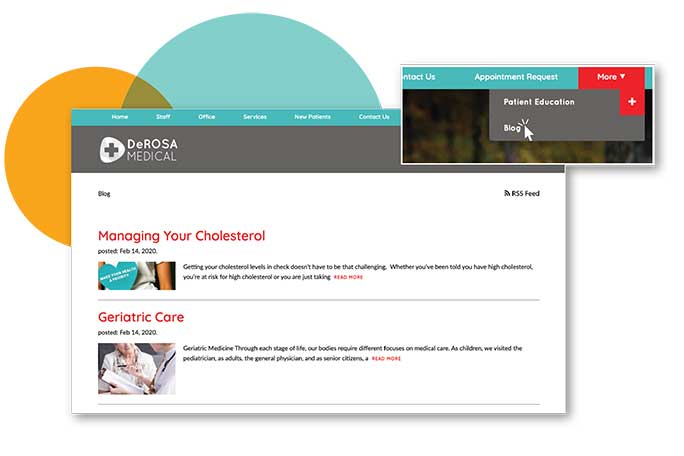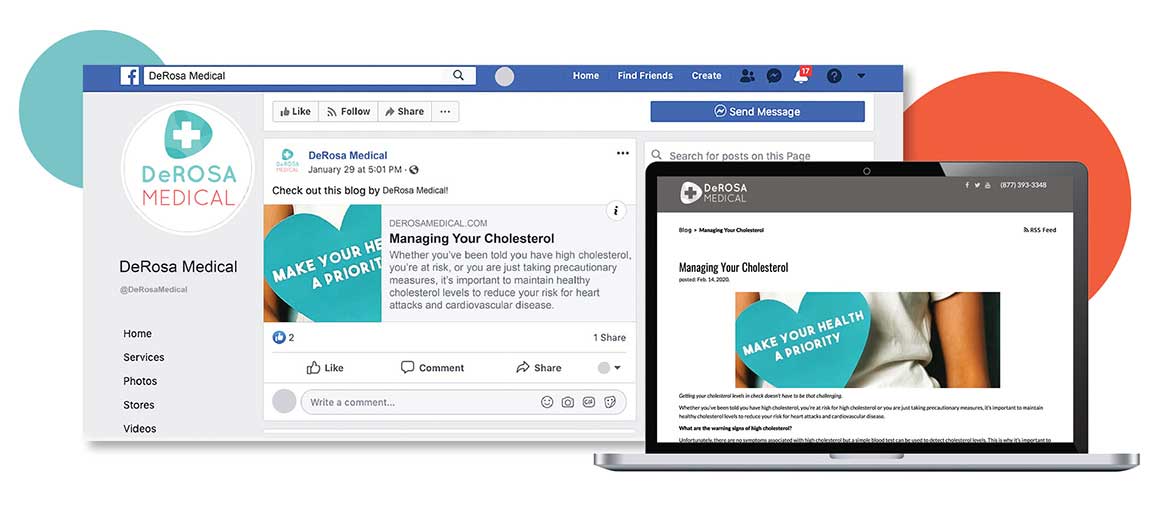Officite’s Medical Blogs Enhance Healthcare Social Media Marketing

Enjoy Healthcare Social Media Marketing Success with Blogs for Doctors

Establish Your Expertise
Improve Your Website's SEO
Local Search Experts
Increase Engagement
Rank Higher with Healthcare Social Media Marketing
Healthcare Social Media Marketing Includes
Drive Website Visitors and Engagement with Healthcare Social Media Marketing
Frequently Asked Questions
How does Officite's healthcare social media marketing help medical practitioners by providing fresh blogs for their websites?
Healthcare social media marketing is essential for connecting with patients and building your practice's reputation. However, simply posting sporadic updates won't cut it. The key to social media success lies in having a constant stream of high-quality content, and that's where a well-curated medical blog becomes crucial.
A medical blog serves as a central hub of valuable information and source of shareable material for healthcare social media marketing. Each thoughtfully written article educates patients and provides a wealth of shareable content for your social media channels. By linking to your blog posts, you entice followers to visit your website, deepening their engagement with your practice.
Blog posts allow you to delve into complex health topics, positioning your practice as a subject matter expert. By sharing insights, addressing common patient concerns, or breaking down the latest research, you build trust and credibility among potential and existing patients. Healthcare social media marketing helps distribute your resources to more people.
Google loves relevant and new content. Regularly updated medical blogs packed with targeted keywords can significantly help your website's cause. Having a constant stream of fresh medical blogs means when people search for health information related to your expertise, your practice is more likely to appear at the top of the results.
Focus on crafting blog posts that directly address your audience's needs. Explain complex medical concepts in plain language, offer preventative care tips, or debunk common health myths. By providing genuine value, you cultivate a loyal readership and encourage patients to view your practice as a trusted resource.
The benefits of medical blogging and healthcare social media marketing extend far beyond social media promotion. A well-written blog humanizes your practice, showcasing your expertise and compassion. It can streamline communications by addressing frequently asked questions, ultimately saving time for your staff. Plus, informed and empowered patients tend to have better health outcomes and greater satisfaction with their care.
To maximize the impact of your medical blog, ensure your content is accurate, well-written, and updated regularly. Use easy-to-understand language and consider incorporating visuals like images or short videos to enhance engagement. Most importantly, write with your patients in mind, addressing their concerns and providing actionable information they can use to improve their health. If you want custom healthcare content on your website, please schedule a call with a Web Presence Advisor today.
What does the "end of the passive patient" mean?
The era of the passive patient, unquestioningly accepting a doctor's recommendations, is fading. Today's patients are informed, proactive, and eager to participate in healthcare decisions. This fundamental shift, fueled mainly by the internet's vast medical information trove, demands a transformation in how medical practitioners approach marketing and communication. In the past, patients relied heavily on doctors and limited resources for health knowledge.
The internet has changed the patient-doctor dynamic. Patients now arrive at consultations armed with research, questions, and sometimes even self-diagnoses. Successful healthcare marketing and healthcare social media marketing strategies must recognize this shift and position medical practices as collaborators, not just sources of authority.
Traditional marketing's focus on broadcasting a branded message falls short in the modern healthcare landscape. Instead of generic advertisements, savvy medical marketers prioritize providing valuable, easily digestible information that addresses patients' core concerns. This fosters trust and strengthens doctor-patient relationships.
While the internet empowers patients, it also presents a challenge. Medical practices often lag behind other industries in their digital marketing sophistication. To remain competitive, they must embrace online channels, meeting patients already seeking health information, and invest in healthcare social media marketing.
The key to effective patient engagement is creating content beyond mere explanation. It should be visually engaging, relevant to patients' needs, and offer actionable guidance. By transforming complex medical information into accessible, empowering resources, medical marketers establish their practices as trusted partners in patients' healthcare journeys. Healthcare social media marketing ensures that your message is transmitted to your readers.
Success in this new era requires understanding that patients are no longer passive care recipients. By embracing patient education, focusing on accessible content, prioritizing genuine engagement, and investing in healthcare social media marketing, medical practices can thrive in this evolving landscape and build lasting relationships with informed, satisfied patients.
What are the advantages of investing in healthcare social media marketing?
Social media lets you connect with a vast audience that might never have found your practice through traditional marketing channels. You can attract potential patients within your local community and beyond by sharing engaging content. Social media provides a platform to showcase your practice's expertise and human side. Your practice can share patient testimonials, highlight staff achievements, or participate in health awareness campaigns. This helps establish your practice as a trusted source of information and care within your community.
Social media isn't just about broadcasting information; it's about two-way communication. Engage with patients by answering questions, responding to comments, and offering support. This fosters a sense of connection and encourages loyalty among your patient base.
Utilize social media to share informative blog posts, health tips, and infographics. By providing easily digestible health information, you empower patients to make informed decisions about their care, leading to better outcomes.
Regular social media activity keeps your practice fresh in the minds of potential and existing patients. Share practice updates, announcements about new services, or timely health reminders relevant to the season.
Social media allows you to monitor patient feedback and address any concerns quickly. Proactively managing your online reputation helps maintain a positive image and attract new patients researching healthcare providers.
Compared to traditional advertising methods, social media marketing can be incredibly budget-friendly. Even with a modest investment, you can significantly expand your reach and build a solid online presence.
Active social media profiles with relevant keywords and backlinks to your website can boost your search engine rankings. This makes it easier for potential patients to find you when searching for healthcare providers online.
Healthcare is dynamic, and social media helps you stay updated on the latest trends, research, and patient concerns. This allows you to adapt your services and communication strategies, ensuring your practice remains relevant and responsive. By harnessing the power of social media, medical practices can attract new patients and foster deeper connections with existing ones, solidify their reputation, and ultimately provide better care within their communities.
What are some best practices when building patient education resources on your practice website?
As each patient is unique, so are their learning preferences and needs. That's why a one-size-fits-all approach to patient education rarely yields the best results. By embracing a mixed-media strategy, you empower patients to engage with health information in the way that resonates most deeply with them.
Some patients thrive on written materials like brochures or detailed articles. Others prefer visual aids like infographics, diagrams, or short explainer videos. Still, others learn best through interactive elements like quizzes or online tools. By providing a variety of formats, you ensure that everyone can understand their health conditions, treatment options, and self-care strategies in a way that works for them.
Effective patient education goes beyond simply handing out resources. It involves understanding the individual's specific needs and tailoring your approach accordingly. Consider factors like:
Literacy - Assess your patient's reading level and choose materials that are clear and easy to understand. Avoid medical jargon and provide definitions when necessary.
Numeracy - If your patient struggles with numbers, focus on visual aids or simplified explanations when discussing statistics or medication dosages.
Culture - Be sensitive to cultural differences that might influence how a patient interprets health information or approaches decision-making.
While some educational materials may touch on potential risks or negative consequences, avoiding fear-mongering tactics is crucial. Instead, emphasize the positive benefits of healthy choices and informed decision-making.
Frame your messaging to empower patients and motivate them to take an active role in their health.
Before sharing any resources with your patient, take the time to review them yourself. Ensure the information is accurate, up-to-date, and aligns with your practice's philosophy of care. Most importantly, remember that even the best educational materials are no substitute for personalized guidance from a healthcare professional. One-on-one consultations allow you to tailor information, address specific questions, and build trust for successful patient-provider collaboration.




